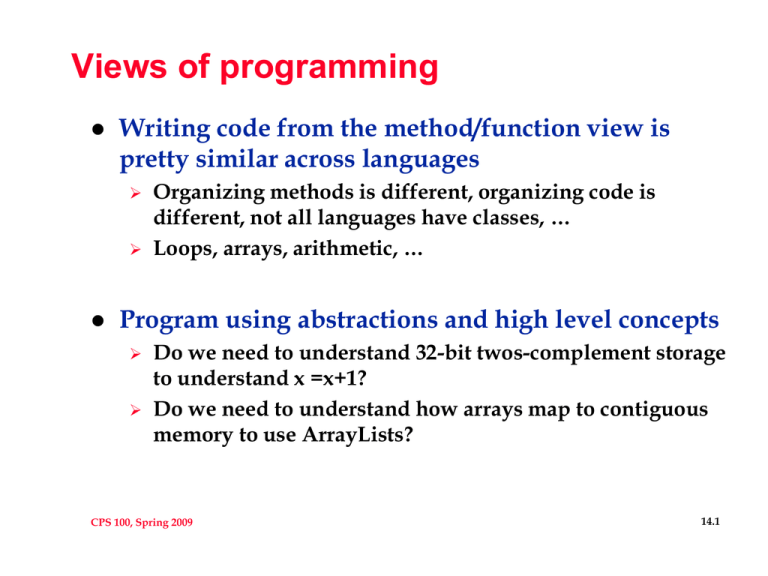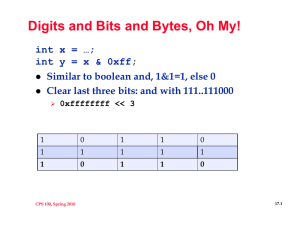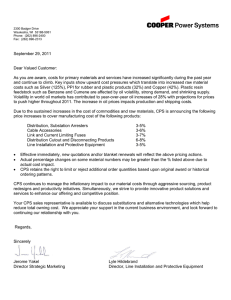Views of programming Writing code from the method/function view is
advertisement

Views of programming
Writing code from the method/function view is
pretty similar across languages
Organizing methods is different, organizing code is
different, not all languages have classes, …
Loops, arrays, arithmetic, …
Program using abstractions and high level concepts
Do we need to understand 32-bit twos-complement storage
to understand x =x+1?
Do we need to understand how arrays map to contiguous
memory to use ArrayLists?
CPS 100, Spring 2009
14.1
Bottom up meets Top down
We teach programming by teaching abstractions
How are programs stored and executed in the JVM?
What’s an array? What’s an ArrayList?
What’s an array in C?
What’s a map, Hashmap? Treemap?
Differences on different architectures?
Similarities between Java and C++ and Python and PHP?
What about how the CPU works? How memory
works? Shouldn’t we study this too?
CPS 100, Spring 2009
14.2
From bit to byte to char to int to long
Ultimately everything is stored as either a 0 or 1
A bit is a binary digit a byte is a binary term (8 bits)
We should be grateful we can deal with Strings rather than
sequences of 0's and 1's.
We should be grateful we can deal with an int rather than
the 32 bits that comprise an int
If we have 255 values for R, G, B, how can we pack
this into an int?
Why should we care, can’t we use one int per color?
How do we do the packing and unpacking?
CPS 100, Spring 2009
14.3
More information on bit, int, long
int values are stored as two's complement numbers
with 32 bits, for 64 bits use the type long, a char is
16 bits
Standard in Java, different in C/C++
Facilitates addition/subtraction for int values
We don't need to worry about this, except to note:
• Infinity + 1 = - Infinity (see Integer.MAX_VALUE)
• Math.abs(-Infinity) > Infinity
Java byte, int, long are signed values, char unsigned
What are values for 16-bit char? 8-bit byte?
Why did this matter in Burrows Wheeler?
CPS 100, Spring 2009
14.4
Signed, unsigned, and why we care
Some applications require attention to memory-use
Difference between one-million bytes, chars, and int
• First requires a megabyte, last requires four megabytes
• When do we care about these differences?
Java signed byte: -128..127, # bits?
Memory is cheaper, faster, …. But applications expand to
use it
What if we only want 0-255? (Huff, pixels, …)
Must either convert negative values or use char, trade-offs?
Java char unsigned: 0..65,536 # bits?
Why is a char unsigned? Other languages like C++/C?
CPS 100, Spring 2009
14.5
More details about bits
How is 13 represented?
… _0_ _0_ _1_ _1_ _0_ _1_
24
23
22
21
20
Total is 8+4+1 = 13
What is bit representation of 32? Of 15? Of 1023?
What is bit-representation of 2n - 1?
What is bit-representation of 0? Of -1?
• Study later, but -1 is all 1’s, left-most bit determines < 0
How can we determine what bits are on? How
many on?
Useful in solving problems, understanding machine
CPS 100, Spring 2009
14.6
How are data stored?
To facilitate Huffman coding we need to read/write
one bit
Why do we need to read one bit?
Why do we need to write one bit?
When do we read 8 bits at a time? Read 32 bits at a time?
We can't actually write one bit-at-a-time. We can't
really write one char at a time either.
Output and input are buffered,minimize memory accesses
and disk accesses
Why do we care about this when we talk about data
structures and algorithms?
• Where does data come from?
CPS 100, Spring 2009
14.7
How do we buffer char output?
Done for us as part of InputStream and Reader
classes
InputStreams are for reading bytes
Readers are for reading char values
Why do we have both and how do they interact?
Reader r = new InputStreamReader(System.in);
Do we need to flush our buffers?
In the past Java IO has been notoriously slow
Do we care about I? About O?
This is changing, and the java.nio classes help
• Map a file to a region in memory in one operation
CPS 100, Spring 2009
14.8
Buffer bit output
To buffer bit output we need to store bits in a
buffer
When the buffer is full, we write it.
The buffer might overflow, e.g., in process of writing 10
bits to 32-bit capacity buffer that has 29 bits in it
How do we access bits, add to buffer, etc.?
We need to use bit operations
Mask bits -- access individual bits
Shift bits – to the left or to the right
Bitwise and/or/negate bits
CPS 100, Spring 2009
14.9
Representing pixels
A pixel typically stores RGB and
alpha/transparency values
Each RGB is a value in the range 0 to 255
The alpha value is also in range 0 to 255
Pixel red = new Pixel(255,0,0,0);
Pixel white = new Pixel(255,255,255,0);
Typically store these values as int values, a picture
is simply an array of int values
void process(int pixel){
int blue = pixel & 0xff;
int green = (pixel >> 8) & 0xff;
int red = (pixel >> 16) & 0xff;
}
CPS 100, Spring 2009
14.10
Bit masks and shifts
void process(int pixel){
int blue = pixel & 0xff;
int green = (pixel >> 8) & 0xff;
int red
= (pixel >> 16) & 0xff;
}
Hexadecimal number: 0,1,2,3,4,5,6,7,8,9,a,b,c,d,e,f
Note that f is 15, in binary this is 1111, one less than 10000
The hex number 0xff is an 8 bit number, all ones
Bitwise & operator creates an 8 bit value, 0—255
Only if stored as an int/char, what happens with byte?
1&1 == 1, otherwise we get 0, similar to logical and
Similarly we have |, bitwise or
CPS 100, Spring 2009
14.11
A Rose by any other name…C or Java?
Why do we use Java in our courses (royal we?)
Object oriented
Large collection of libraries
Safe for advanced programming and beginners
Harder to shoot ourselves in the foot
Why don't we use C++ (or C)?
Standard libraries weak or non-existant (comparatively)
Easy to make mistakes when beginning
No GUIs, complicated compilation model
What about other languages?
CPS 100, Spring 2009
14.12
Why do we learn other languages?
Perl, Python, PHP, Ruby, C, C++, Java, Scheme, ML,
…
Can we do something different in one language?
• Depends on what different means.
• In theory: no; in practice: yes
What languages do you know? All of them.
In what languages are you fluent? None of them
In later courses why do we use C or C++?
Closer to the machine, we want to understand the machine
at many levels, from the abstract to the ridiculous
• Or at all levels of hardware and software
Some problems are better suited to one language
• What about writing an operating system? Linux?
CPS 100, Spring 2009
14.13
Unique words in Java
import java.util.*;
import java.io.*;
public class Unique {
public static void main(String[] args)
throws IOException{
Scanner scan =
new Scanner(new File("/data/melville.txt"));
TreeSet<String> set = new TreeSet<String>();
while (scan.hasNext()){
String str = scan.next();
set.add(str);
}
for(String s : set){
System.out.println(s);
}
}
}
CPS 100, Spring 2009
14.14
Bjarne Stroustrup, Designer of C++
Numerous awards,
engineering and science
ACM Grace Hopper
Formerly at Bell Labs
Now Texas A&M
“There's an old story about the person who wished
his computer was as easy to use as his telephone.
That wish has come true, since I no longer know
how to use my telephone.”
Bjarne Stroustrup
CPS 100, Spring 2009
14.15
Unique words in C++
#include <iostream>
#include <fstream>
#include <set>
using namespace std;
int main(){
ifstream input("/data/melville.txt");
set<string> unique;
string word;
while (input >> word){
unique.insert(word);
}
set<string>::iterator it = unique.begin();
for(; it != unique.end(); it++){
cout << *it << endl;
}
return 0;
}
CPS 100, Spring 2009
14.16
PHP, Rasmus Lerdorf and Others
Rasmus Lerdorf
Personal Home Page
Qeqertarsuaq, Greenland
1995 started PHP, now part of it
http://en.wikipedia.org/wiki/PHP
No longer an acronym
“When the world becomes standard, I will
start caring about standards.”
Rasmus Lerdorf
CPS 100, Spring 2009
14.17
Unique words in PHP
<?php
$wholething = file_get_contents("file:///data/melville.txt");
$wholething = trim($wholething);
$array = preg_split("/\s+/",$wholething);
$uni = array_unique($array);
sort($uni);
foreach ($uni as $word){
echo $word."<br>";
}
?>
CPS 100, Spring 2009
14.18
Guido van Rossum
BDFL for Python development
Python is multi-paradigm
Benevolent Dictator For Life
Late 80’s began development
OO, Functional, Structured, …
We're looking forward to a future where every computer user
will be able to "open the hood" of their computer and make
improvements to the applications inside. We believe that this
will eventually change the nature of software and software
development tools fundamentally.
Guido van Rossum, 1999!
CPS 100, Spring 2009
14.19
Unique Words in Python
#! /usr/bin/env python
import sys
import re
def main():
f = open('/data/melville.txt', 'r')
words = re.split('\s+',f.read().strip())
allWords = set()
for w in words:
allWords.add(w)
for word in sorted(allWords):
print "%s" % word
if __name__ == "__main__":
main()
CPS 100, Spring 2009
14.20
Kernighan and Ritchie
First C book, 1978
First ‘hello world’
Ritchie: Unix too!
Kernighan: tools
Turing award 1983
Strunk and White
Everyone knows that debugging is twice as hard as
writing a program in the first place. So if you are as
clever as you can be when you write it, how will you
ever debug it?
Brian Kernighan
CPS 100, Spring 2009
14.21
How do we read a file in C?
#include <stdio.h>
#include <string.h>
#include <stdlib.h>
int strcompare(const void * a, const void * b){
char ** stra = (char **) a;
char ** strb = (char **) b;
return strcmp(*stra, *strb);
}
int main(){
FILE * file = fopen("/data/melville.txt","r");
char buf[1024];
char ** words = (char **) malloc(5000*sizeof(char **));
int count = 0;
int k;
CPS 100, Spring 2009
14.22
Storing words read when reading in C
while (fscanf(file,"%s",buf) != EOF){
int found = 0;
// look for word just read
for(k=0; k < count; k++){
if (strcmp(buf,words[k]) == 0){
found = 1;
break;
}
}
if (!found){
// not found, add to list
words[count] = (char *) malloc(strlen(buf)+1);
strcpy(words[count],buf);
count++;
}
}
Complexity of reading/storing? Allocation of
memory?
CPS 100, Spring 2009
14.23
Sorting, Printing, Freeing in C
qsort(words,count,sizeof(char *), strcompare);
for(k=0; k < count; k++) {
printf("%s\n",words[k]);
}
for(k=0; k < count; k++){
free(words[k]);
}
free(words);
}
Sorting, printing, and freeing
How to sort? What’s analgous to comparator?
Why do we call free? Necessary in this program? Why?
CPS 100, Spring 2009
14.24


